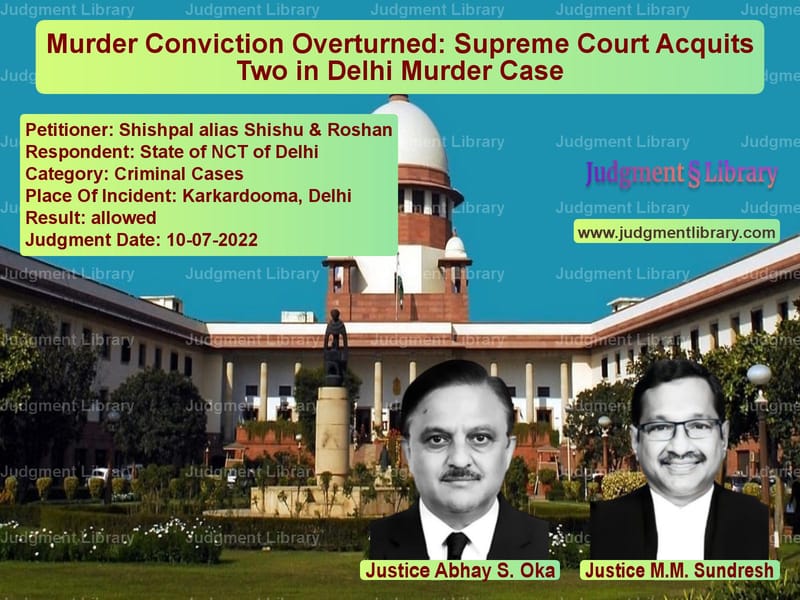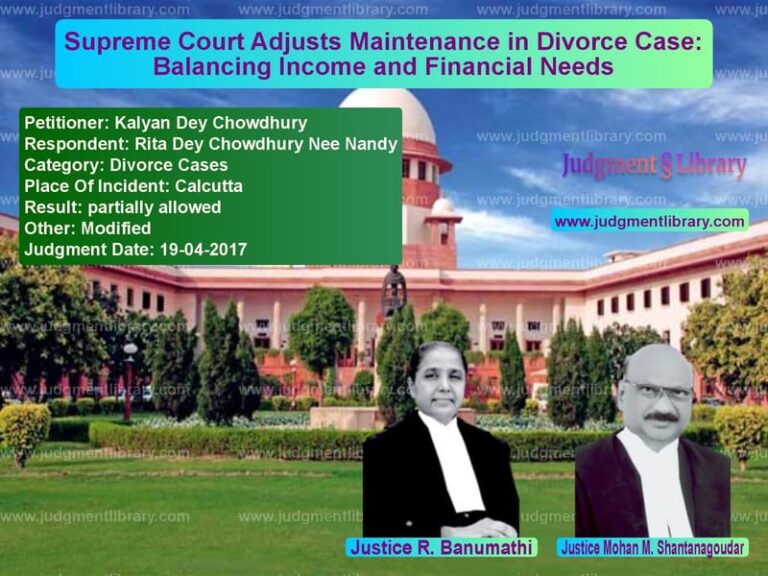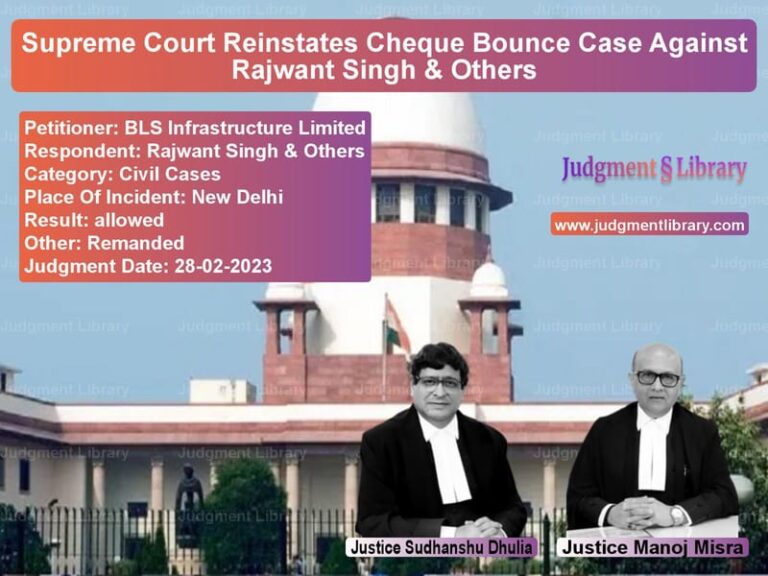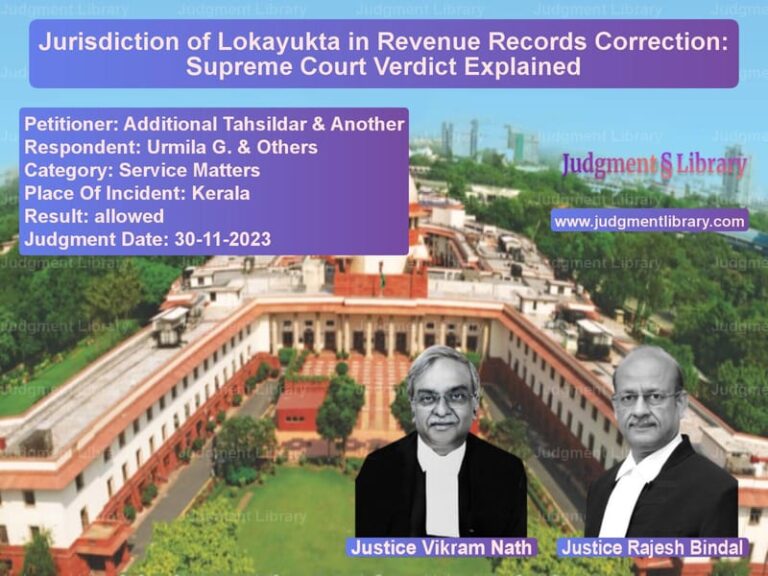Murder Conviction Overturned: Supreme Court Acquits Two in Delhi Murder Case
The Supreme Court of India, in a significant judgment, overturned the conviction of two individuals sentenced to life imprisonment for a murder case in Delhi. The appellants, **Shishpal alias Shishu and Roshan**, were convicted under **Section 302 read with Section 34 of the Indian Penal Code (IPC)** by the Additional Sessions Judge (East) at Karkardooma Court, Delhi. The High Court of Delhi later upheld this conviction. However, after reviewing the evidence, the Supreme Court set aside the conviction and directed the immediate release of the appellants.
Background of the Case
The case dates back to **January 10, 2010**, when a murder occurred outside a liquor shop. The prosecution alleged that the deceased was attacked by three individuals, with one accused (A-2) stabbing the victim while the other two (the appellants) held him down. Following the investigation, the **Sessions Court convicted all three accused**, sentencing them to **life imprisonment**. The High Court upheld the conviction, prompting the appellants to approach the Supreme Court.
Legal Questions Raised
The case raised important legal questions regarding:
- **The credibility of eyewitness testimony:** The prosecution’s key witness was a police informant.
- **The applicability of Section 34 IPC (common intention):** Whether mere presence at the crime scene is sufficient to establish common intention.
- **Procedural lapses in the investigation:** Allegations that the accused were shown to witnesses before identification.
- **The role of adverse inference in TIP refusal:** Whether refusing to participate in a Test Identification Parade (TIP) can be used against the accused.
Petitioner’s Arguments
The appellants challenged their conviction on the following grounds:
- **Unreliable Eyewitness Testimony**: The prosecution’s star witness (PW3) was a known police informant and had testified in at least seven other cases. His credibility was questionable.
- **Lack of Independent Corroboration**: The prosecution failed to produce independent witnesses to confirm the presence of the accused at the crime scene.
- **Failure to Prove Common Intention**: The mere presence of the accused was insufficient to invoke **Section 34 IPC** (common intention).
- **Motive Not Established**: The prosecution did not provide a clear reason why the appellants would have participated in the crime.
- **Contradictory Statements of Prosecution Witnesses**: Multiple witnesses gave inconsistent versions of events, creating doubts about the reliability of the prosecution’s case.
Respondent’s Arguments
The prosecution (State of NCT of Delhi) defended the conviction, arguing:
- **Presence of Eyewitnesses**: The prosecution relied on testimonies of witnesses, particularly PW3, who claimed to have seen the accused holding the victim.
- **Section 34 IPC Justification**: The prosecution asserted that the collective actions of the accused indicated a common intention to commit the crime.
- **Test Identification Parade (TIP) and Recovery**: The refusal of the accused to participate in a TIP was presented as an indication of guilt.
- **Forensic Evidence Corroboration**: Bloodstains found at the scene matched the victim’s blood group.
Supreme Court’s Observations
After reviewing the evidence, the Supreme Court made the following key observations:
- **Doubtful Eyewitness Testimony**: The Court noted that PW3 was a stock witness frequently testifying for the police. His account lacked credibility.
- **Failure of Prosecution to Prove Common Intention**: The judgment stated: “There has to be adequate material to fasten the appellants on the basis of constructive liability as Section 34 IPC is nothing but a rule of evidence.”
- **Contradictory Statements**: The testimonies of prosecution witnesses contained inconsistencies, making it unsafe to convict the accused solely based on them.
- **Adverse Inference from TIP Refusal Not Justified**: The Court ruled that refusal to participate in a TIP cannot automatically be construed as guilt.
- **Failure to Prove Motive**: The Court emphasized that motive, though not essential, is an important aspect in cases where circumstantial evidence is relied upon.
Key Legal Precedents Referenced
The Court relied on the following landmark judgments:
- **Hussainara Khatoon v. State of Bihar**: Emphasized the right to a speedy trial and bail as the rule.
- **Arnesh Kumar v. State of Bihar**: Directed that arrests should not be made in a routine manner.
- **Sanjay Chandra v. CBI**: Held that economic offenses should not automatically lead to denial of bail.
- **Vadivelu Thevar v. State of Madras**: Defined three types of witnesses – wholly reliable, wholly unreliable, and partly reliable.
Final Judgment
The Supreme Court set aside the conviction, stating:
“On the above analysis, we are inclined to set aside the conviction rendered by the learned Additional Sessions Judge (East) FTC: E-Court, Karkardooma Court, Delhi as confirmed by the Division Bench of the High Court of Delhi. The appeals stand allowed, and the appellants are directed to be set at liberty.”
With this ruling, the Supreme Court reinforced the principle that convictions must be based on **reliable evidence** and that mere presence at the scene of a crime does not automatically establish guilt.
Read also: https://judgmentlibrary.com/bail-guidelines-and-judicial-interpretation-in-criminal-cases/
Petitioner Name: Shishpal alias Shishu & Roshan.Respondent Name: State of NCT of Delhi.Judgment By: Justice Abhay S. Oka, Justice M.M. Sundresh.Place Of Incident: Karkardooma, Delhi.Judgment Date: 10-07-2022.
Don’t miss out on the full details! Download the complete judgment in PDF format below and gain valuable insights instantly!
Download Judgment: shishpal-alias-shish-vs-state-of-nct-of-delh-supreme-court-of-india-judgment-dated-10-07-2022.pdf
Directly Download Judgment: Directly download this Judgment
See all petitions in Bail and Anticipatory Bail
See all petitions in Custodial Deaths and Police Misconduct
See all petitions in Judgment by Abhay S. Oka
See all petitions in Judgment by M.M. Sundresh
See all petitions in allowed
See all petitions in supreme court of India judgments July 2022
See all petitions in 2022 judgments
See all posts in Criminal Cases Category
See all allowed petitions in Criminal Cases Category
See all Dismissed petitions in Criminal Cases Category
See all partially allowed petitions in Criminal Cases Category







